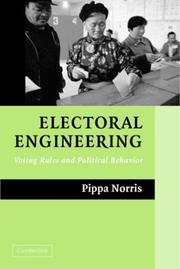| Listing 1 - 1 of 1 |
Sort by
|

ISBN: 0521829771 0521536715 0511187521 9780511187520 9780521536714 9780521829779 0511184859 9780511184857 0511185685 9780511185687 9780511790980 0511790988 1280449314 9781280449314 0511186592 9780511186592 9786610449316 6610449317 1107147999 9781107147997 0511313616 9780511313615 Year: 2004 Publisher: Cambridge Cambridge University Press
Abstract | Keywords | Export | Availability | Bookmark
 Loading...
Loading...Choose an application
- Reference Manager
- EndNote
- RefWorks (Direct export to RefWorks)
From Kosovo to Kabul, the last decade witnessed growing interest in ?electoral engineering?. Reformers have sought to achieve either greater government accountability through majoritarian arrangements or wider parliamentary diversity through proportional formula. Underlying the normative debates are important claims about the impact and consequences of electoral reform for political representation and voting behavior. The study compares and evaluates two broad schools of thought, each offering contracting expectations. One popular approach claims that formal rules define electoral incentives facing parties, politicians and citizens. By changing these rules, rational choice institutionalism claims that we have the capacity to shape political behavior. Alternative cultural modernization theories differ in their emphasis on the primary motors driving human behavior, their expectations about the pace of change, and also their assumptions about the ability of formal institutional rules to alter, rather than adapt to, deeply embedded and habitual social norms and patterns of human behavior.
International relations. Foreign policy --- Affiliation aux partis politiques --- Comparative government --- Comparative political systems --- Comparative politics --- Elections --- Gouvernement comparé --- Gouvernement représentatif --- Government [Comparative ] --- Institutions politiques -- Études comparatives --- Institutions politiques comparées --- Opérations de vote --- Parlementarisme --- Parliamentary government --- Partis politiques [Affiliation aux ] --- Party affiliation --- Political affiliation --- Political representation --- Political systems [Comparative ] --- Politieke partijen [Toetreding tot de ] --- Politique comparée --- Representation --- Representative government and representation --- Régimes politiques --- Scrutin --- Secret de vote --- Self-government --- Stemmen (Politiek) --- Sécurité de vote --- Toetreding tot de politieke partijen --- Vergelijkend bestuur --- Verkiezingen --- Volksvertegenwoordiging --- Vote --- Vote secret --- Votes --- Voting --- Élections--Modalités --- Elections. --- Voting. --- Party affiliation. --- Representative government and representation. --- Comparative government. --- Partis politiques --- Adhésion --- 342.8 --- #SBIB:041.IO --- #SBIB:324H42 --- Government, Comparative --- Political systems, Comparative --- Political science --- Constitutional history --- Constitutional law --- Democracy --- Republics --- Suffrage --- Affiliation, Party --- Political parties --- Polls --- Politics, Practical --- Social choice --- Electoral politics --- Franchise --- Plebiscite --- Political campaigns --- Kiesrecht --(algemeen) --- Politieke structuren: verkiezingen --- Membership --- 342.8 Kiesrecht --(algemeen) --- Adhérents d'un parti --- Adhésion politique --- Adhésion à un parti --- Affiliation [Party ] --- Affiliation à un parti --- Appartenance à un parti --- Membres d'un parti --- Partis politiques -- Adhésion --- Partis politiques -- Membres --- Political parties -- Membership --- Gouvernement représentatif --- Institutions politiques comparées --- Adhésion --- Balloting --- Social Sciences --- Political Science
| Listing 1 - 1 of 1 |
Sort by
|

 Search
Search Feedback
Feedback About UniCat
About UniCat  Help
Help News
News